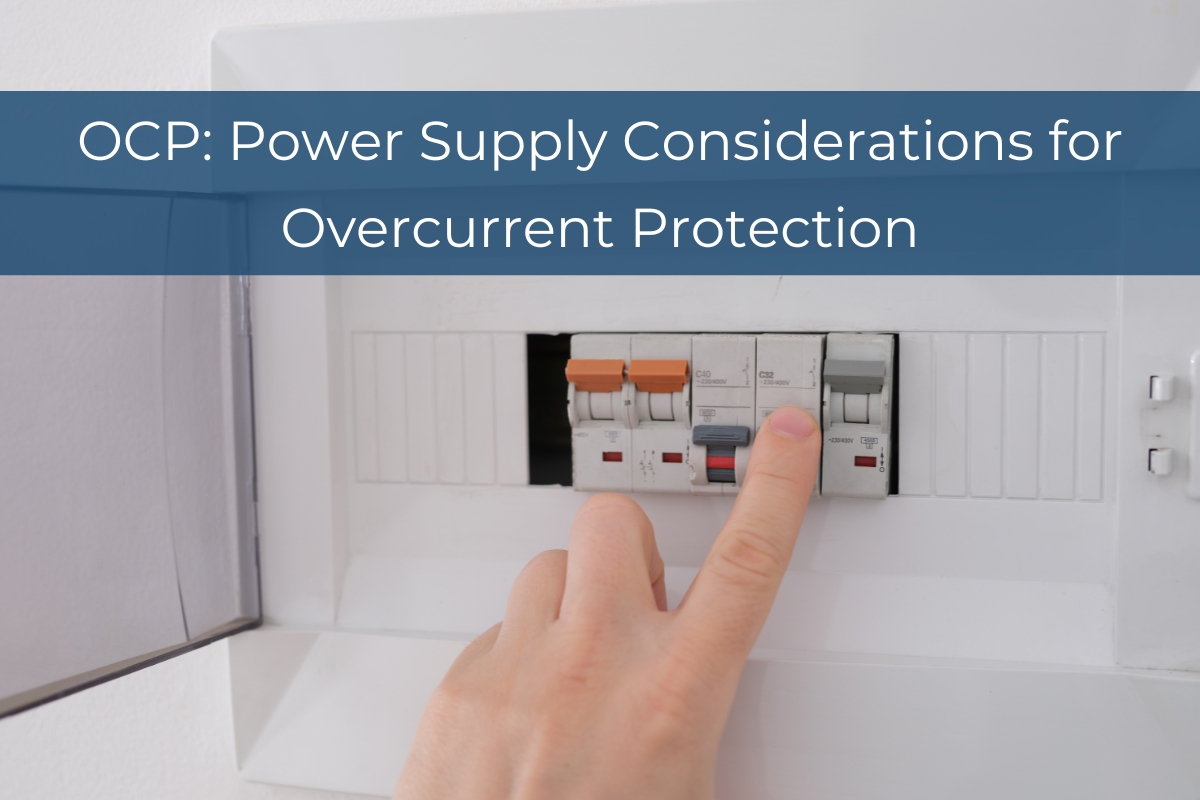Power supplies for medical devices need to come with certain protections to defend against power surges, outages, and other unexpected events that can impact the power supply, device, and environment where the equipment operates. If necessary, these protections can monitor values and even shut down power supplies as needed. In this article, we’ll cover overcurrent protection (OCP) and what manufacturers should look for in power supplies.
What is Overcurrent Protection (OCP)?
Overcurrent Protection (OCP) in a power supply monitors current levels in the rails. If currents go beyond a specific amount, OCP will shut down the power supply. Think of it working similar to a circuit-breaker in a building – when demand gets overwhelming, the OCP is there to shut down the power supply. This prevents things like melted cables, damaged components, and fire.
Why is OCP in power supplies important, especially for medical devices?
Medical devices often have more stringent safety measures compared to other, similar electric devices because of how directly they interact with patients. If a power supply malfunctions in a medical device, there can be serious consequences for patients and operators. OCP is designed to prevent burns, shocks, and other current-related injuries.
Regulatory standards are also different for medical devices. For example, medical equipment that needs a PC-based power supply to run needs to comply with IEC 60601-1, along with other standards depending on the type of device and the nature of contact with the patient. Overcurrent protection is a central part of these standards.
While other devices can contain sensitive equipment, medical devices are more likely to have delicate electronics that can be quickly damaged by excessive currents, making OCP a requirement for proper operation.
What should medical device manufacturers consider with OCP and power supplies?
The IEC 60601-1 standard, as previously mentioned, outlines certain requirements for overcurrent protection. This includes how circuit breakers and fuses can be used appropriately in the power supply, and what should be done to prevent excessive leakage currents from happening. Medical device manufacturers should know which regulatory standards power supply vendors have met. Non-compliance on a key standard can mean a delay in gaining FDA approval or entering other target markets.
Redundancy can also be important with medical devices that serve critical applications. This means that if there is an overcurrent event, the device can switch to a secondary mechanism and protect itself.
Other shields and monitors that might be used include ground fault circuit interrupters (GFCIs), which interrupt found circuits that have dangerous ground faults, as well as surge protection, which can prevent devices from being exposed to transient overvoltages that could otherwise damage and impair components.
What are some examples of OCP in power supplies for medical devices?
Many different medical devices rely on OCP to function properly. For example, defibrillators use OCP to prevent excessive high-voltage current from getting passed on to the patient and causing harm. Infusion pumps can use OCP to prevent over-delivery of medications that may be doled out excessively due to electronic failures. OCP is also vital with ventilators – if these malfunction, they can significantly impair respiratory function in patients.
What should you look for in power supply protections?
OCP Power Supply protection is only one mitigation tactic manufacturers should look for out of 7. These protections also include:
- Overpower protection (OPP)
- Overvoltage protection (OVP)
- Undervoltage protection (UVP)
- Short-Circuit Protection (SCP)
- Over-Temperature Protection (OTP)
- Surge and Inrush Protection (SIP)
A safe power supply should have all of these protections to keep the medical device, caregivers, and patients safe. RAM Technologies offers long-lasting operation, reliability, and safety with all 7 forms of protection. To ask questions about the features of our PC-based power supplies for medical devices, reach out.
RAM Technologies’ power supplies are 60601-1 3.2 certified. When you’re designing your medical device and need help with a PSU, contact us for details.
More Resources:
What the FDA Moving to IEC 60601-1 3.2 Means for Manufacturers
7 Protections to Look For in a Power Supply
EMC Compliance and EN 55011
